Truck Drivers are Extremely Sleep Deprived

There is a need for increasing awareness and improving the diagnosis and treatment of sleep disorders
Nearly a third of Americans are getting inadequate sleep — including police offices, healthcare workers and truck drivers — and it is getting worse with every passing year, says a new study from Ball State University.
“Short Sleep Duration in Working American Adults,” an analysis of more than 150,000 working adults from 2010 to 2018, found that prevalence of inadequate sleep — 7 hours or less — increased from 30.9% of respondents in 2010 to 35.6% in 2018. The study was posted Monday by the Journal of Community Health.
The study also found that the people who report getting the fewest hours of shut-eye include native born Americans, who are female, have children at home, work for the government, and live in the South.
“Inadequate sleep is associated with mild to severe physical and mental health problems, injury, loss of productivity, and premature mortality,” said Jagdish Khubchandani, lead author and a health science professor at Ball State. “This is a significant finding because the U.S. is currently witnessing high rates of chronic diseases across all ages, and many of these diseases are related to sleep problems.”
The study found that in 2018, professions with the highest levels of poor sleep including those in the police and military (50%), health care support occupations (45%), transport and material moving (41%), and production occupations (41%).
“There is no definitive cause found for these trends in sleep duration in working American population,” Khubchandani said. “We see the workplace is changing as Americans work longer hours, and there is greater access and use of technology and electronic devices, which tend to keep people up at night. Add to this the progressive escalation in workplace stress in the United States, and the rising prevalence of multiple chronic conditions could be related to short sleep duration in working American adults.”
The study also found:
- For men, about 30.5% reported getting 7 or less hours of sleep in 2010 and by 2018 about 35.5% reporting inadequate sleep.
- Among women, those reported too little sleep grew from 31.2% in 2011 to 35.8% in 2018.
- By race and inadequate sleep prevalence, the trend from 2010-2018 was 29.2 to 34.1% for whites, 40.6 to 46.5% for African-Americans, 29.5 to 35.3% for Asians, and 35.2 to 45.2% for multiracial adults.
- From 2010 to 2018, the largest increases in sleep deprivation were reported by men, multiracial individuals, older adults, those living in the western U.S., and widowed, divorced, or separated people.
Khubchandani believes that employers should take steps to make sure their workers are getting enough rest.
“Employers have a major responsibility and should use health promotion strategies to ensure that workers who struggle with sleep problems are assisted,” he said. “We all suffer when our bus and truck drivers, doctors, and nurses are sleep deprived.”
Khubchandani also warns that the use of over-the-counter medications may be making life miserable for millions of Americans.
Many of these medications can have side effects, including worsening of insomnia when inappropriately prescribed or used. Even in primary care, insomnia is frequently misreported, ignored, or the treatment could be suboptimal, despite access to standard treatment interventions, he said.
Khubchandani also suggests that from a public health perspective, chronic sleep problems need management by qualified professionals.
“There is a need for increasing awareness and improving the diagnosis and treatment of sleep disorders,” he said, “and there needs to be emphasis on public education, training for health professionals, and monitoring.”
Category: Driver Stuff, Featured, General Update, News, Safety










